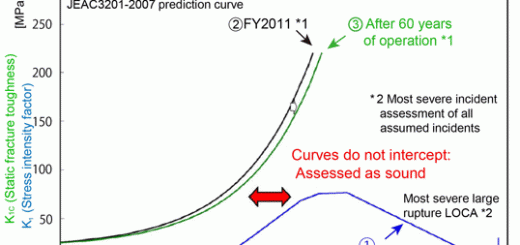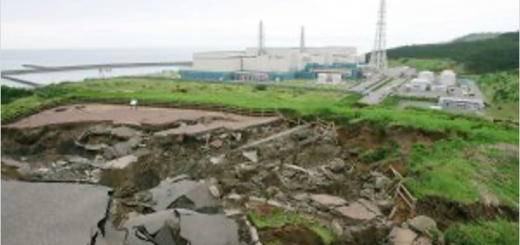Tsuruga Unit 2 Reactor Fails to Meet New Regulatory Standards
By Nishio Baku
Nuclear Reactor Regulation Act Requires Revocation of Permit
It was confirmed on August 2 at an extraordinary meeting of Japan’s Nuclear Regulation Authority (NRA) that the Tsuruga Nuclear Power Station Unit 2 reactor would not be allowed to restart. All five members on the committee, chaired by Yamanaka Nobusuke, were unanimous in instructing the NRA Secretariat to prepare a draft review document summarizing the failure to pass the review that Japan Atomic Power Co. (JAPC) had applied for to certify conformity of changes in reactor installation with the new regulatory standards. The draft review is expected to be approved in late August, after which public comment will be solicited for 30 days, with the official decision to withhold the permit handed down as early as October.
JAPC resisted this decision to the bitter end. They released a comment on August 2, saying “In preparation for the operation of Tsuruga Unit 2, we will make efforts to conduct additional surveys, obtain more data and so on and consider how we will deal with this in the future.” On the 5th, General Manager Sakai Takeshi of the Tsuruga Head Office visited the Fukui Prefectural and Tsuruga City offices, reporting that the company would undertake additional investigations so that operations could resume and it would consider future measures.
Even if the modified reactor installation is not approved because it does not conform to the new regulatory standards, it does not mean that the permit for the original installation will be revoked. JAPC can apply for approval of changes in the reactor installation again just by saying, “Our additional investigations indicate that the reactor conforms to the new regulatory standards.” In this way, the current Nuclear Reactor Regulation Act is flawed—although it stipulates that a permit for a reactor installation should be granted only when it is recognized as meeting the standards, it does not revoke the permit even if non-compliance is discovered subsequently.
One might argue half-jokingly that if obstruction of a review, such as through falsification of documents, is recognized as having prevented the plant’s restart, perhaps it would be possible to revoke the approval through the provisions in Article 43, Item 3-20 of the Nuclear Reactor Regulation Act as a case of “When operation of a power-generating nuclear reactor does not commence within the period specified in the NRA’s regulations without a valid reason, or if the operation of a power-generating nuclear reactor is suspended for more than one year,” but that is a real stretch.
This kind of situation is likely to arise in the future. Shouldn’t the Nuclear Reactor Regulation Act be amended, with an added provision to revoke the permit of a reactor if it is found to be in non-compliance with the standards in the reactor installation permit?
Of course, even if the permit is revoked, it would still be possible for the company to reapply, starting from the reactor installation approval stage. Still, it would hopefully be clear that the reactor was not in a state that would allow its approval.
Shrill Denunciations from Nuclear Promoters
The NRA’s decision shocked Japan’s “Nuclear Village” (faction promoting nuclear power), who burst into what looked like a terminal fit of shrieking hysteria.
The Sankei Shimbun’s “Shucho (assertions)” editorial column on July 27 and August 7 repeatedly accused the NRA of demanding “the devil’s proof.” On the 7th, it declared, “Isn’t it the role of Kishida Fumio’s administration to expunge the NRA’s self-righteousness? Doesn’t the Liberal Democratic Party (LDP) have a ‘Special Committee on Nuclear Regulation’? The decision to withhold approval of Unit 2 was made when the Diet was not in session. We want Prime Minister Kishida to initiate an investigation to verify whether this safety review is valid or not. If we let this slide, Japan will fall into energy deficiency.” On August 5, Sakurai Yoshiko’s “Utsukushiki Tsuyoki Kuni E (for a beautiful strong nation)” series in the same newspaper was titled “Akuma no Gotoki Kiseii no Shisen (the NRA has a gaze like the devil).”
In Issue 8 of Energy Forum, Specially Appointed Professor Narabayashi Tadashi of the Institute of Science Tokyo (previously Tokyo Institute of Technology) said, “If the NRA ‘bases its judgments only on safety,’ should they not let the Minister of Economy, Trade and Industry have a driver’s license?”
Representative Ishikawa Kazuo of the Institute of Social Security and Economics chimed in, “The Electricity Business Act should be amended to give it the power to order operation…If the government appoints people who do not like the way the NRA is run now, they may be able to break through this log jam.” What a lame assertion.


